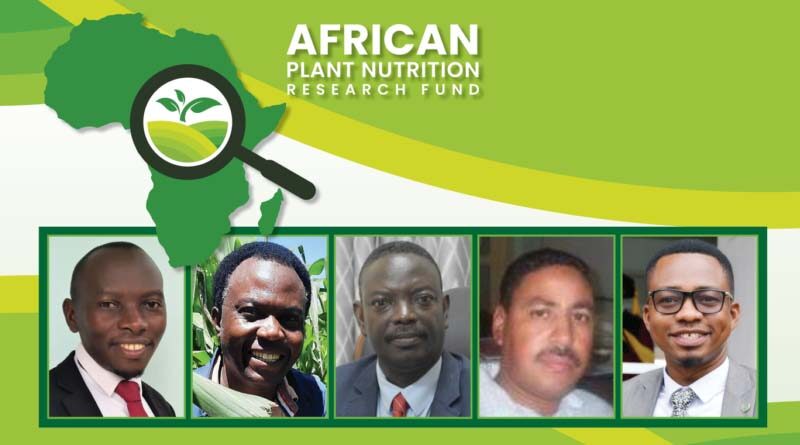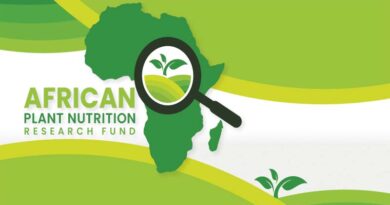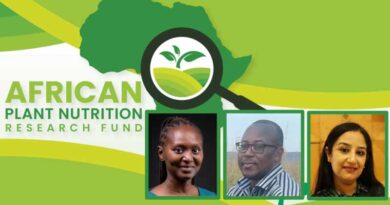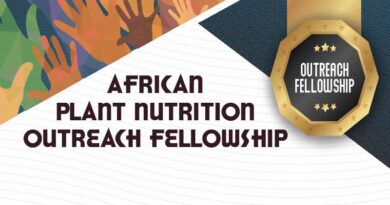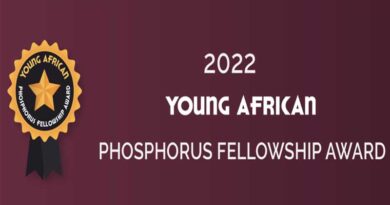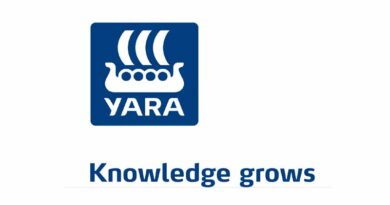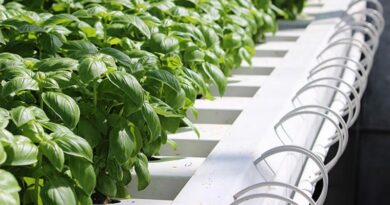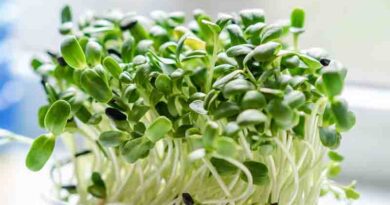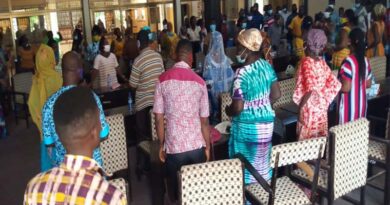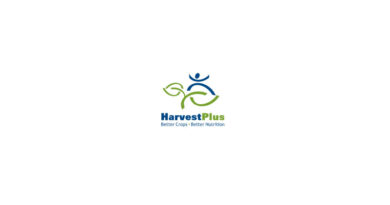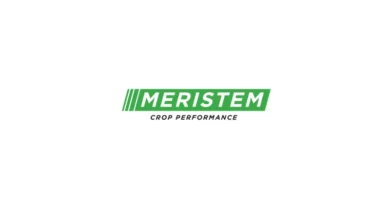African Plant Nutrition Research Fund Selects Grant Recipients
22 January 2022, Africa: The African Plant Nutrition Research Fund (APNRF) has announced the finalists of its inaugural call for research proposals to support agricultural research for development. Four projects were selected during a highly competitive assessment process including 117 applications representing 25 countries across Africa.
The aim of the APNRF is to enable scaling of improved nutrient and soil fertility management by synergistically extending research conducted in strategic priority areas of APNI: 1) Climate and Weather-Smart Plant Nutrition; 2) Soil Health for Improved Livelihoods; and 3) Precision Nutrient Management. The fund was created through a partnership between APNI and Mohammed VI Polytechnic University (UM6P).
Summaries of the projects and the principal investigators are provided below. Work within each of the projects selected is expected to commence during the first quarter of 2022. For more details on the APNRF, visit www.apni.net/research-fund
Dr. Patrick Musinguzi, Principal Investigator – Department of Agricultural Department, School of Agricultural Sciences, Makerere University, Kampala, Uganda
Enhancing Rice Productivity through Adaptation of Climate-Smart Agricultural Options and Market Responsive Business Strategies in Uganda
Rainfed upland rice is an important and strategic food and income security crop. In Uganda rice is grown by over 241,000 households in almost all districts of the country on 100,792 ha. Yields of 0.9 t/ha are experienced with total value of production of UGX 207 billion (UBOS, 2021) contributing to household income for 4.1% of all agricultural households in Uganda. However, climate related shocks including droughts and low soil fertility have led to declining yield and income. The low income has been compounded by fluctuations in market price thereby negatively impacting on participants in the rice value chain. As such, farmers remain small-scale with limited incentives for engaging in profitable business ventures thus resulting in demotivation of rice farmers and affecting progress for livelihood improvement. Holistic adaptation measures to extreme weather, climate change, soil nutrient management, price fluctuation risks and other social related shocks can be a major intervention amidst such production and business risks. These adaptation intervention measures need to be evaluated scientifically as potential sustainable pathways for transformation of rice farming as a business.
Also Read: Union Budget 2022-23: Transformation Agriculture through irrigation and win back India’s farmer
The project aims at achieving this goal in three years with four objectives:
- Evaluate nutrient and water use efficiency under adaptable nutrient, water and agronomic management packages to variable weather and climate change for increased rice production
- Determine the economic viability of climate smart options for improving rice productivity and mitigating risks and shocks
- Strengthen the farmer-market institutions for improved efficiency in the production and marketing of rice
- Enhance the uptake of adaptable business and agronomic options for increased resilience to climate change and price risks among rice farmers in Uganda
- Dr. Onesmus Kitonyo, Principal Investigator – Department of Plant Science and Crop Protection, University of Nairobi, Nairobi, Kenya
Fine-Tuning Climate-Smart Nitrogen Management Practices in Maize-Based Crop Systems of Eastern Kenya
Maize is a major staple and cash crop in Kenya. However, there is a large gap between actual yield, often less than 1 t/ha and yield potential, which is about 5 t/ha. This yield gap is confounded by both inter- and intra-seasonal variation in rainfall, which in turn makes investment in fertilizer risky. The use of nitrogen fertilizer in maize-based crop systems is low and often guided by out-dated recommendations that do not account for spatial and temporal variation in fertilizer N response and use efficiency. Owing to the strong interplay between water and nitrogen as drivers of yield of dryland maize-based crop systems, a multi-faceted approach is required to improve yield. A quantitative delineation of water and nitrogen stress patterns, coupled with realistic, local benchmarks for water and nitrogen use efficiency could guide the deployment of climate-smart interventions in maize. In addition, future opportunities to increase maize yield ought to concurrently increase water and N use efficiency but the simultaneous management of water and nitrogen stress is challenging. In this context, further empirical and modeling studies are required to improve the management of nitrogen in variable and changing climates, leading to easy-to-use decision support tools. The project recognizes that transition from initial adoption in pilot projects to sustained scaling of technologies has been limited, and could be accelerated through the integration of business and investment opportunities for agents of change in the value chain. The project focuses on improving the productivity and resilience of maize-based crop systems in eastern Kenya, with the enabling aims to:
- Characterize business models that support adoption and scaling of weather sensitive nutrient management technologies, innovations and management practices
- Identify and map maize stress patterns
- Benchmark upper limits for water and nitrogen use efficiency of maize
- Validate and promote best management practices for soil moisture conservation and N use efficiency
- Develop and validate easy-to-use water and N budget calculator
Outputs of the project will inform and create investment opportunities in digital precision agriculture tools, e-extension services, agricultural mechanization, and crop insurance. Smallholder farmers will benefit from improved yield, higher profit, reduced risk and systems’ resilience.
Dr. Abdelaziz Bouizgaren, Principal Investigator – Institut National de la Recherche Agronomique (INRA Maroc), Marrakesh, Morocco
Improving Water and Nutrient Use Efficiency to Increase Moroccan Olive Climate Resilience
The world’s future climate is projected to become increasingly problematic for agriculture, likely leading to chronic water shortages, and consequently arises difficulties in orchard management with potential decline in productivity and quality. Spatiotemporal climate change is expected to be dramatic with unexpected impacts on the agriculture systems and the livelihood of farmers. In Morocco, olive, one of the strategic species in agricultural policies, is nowadays among trees most subjected to water scarcity and therefore productivity decrease. In this context, the ‘OliveFertiClim’ project aims to study the compromise between nutrients uptake efficiency and the olive tree response to soil water availability and vapor pressure deficit under irrigated system in contrasted climates (North and South-central Morocco) with the use of remote sensing technologies. Through the project, field surveys will be carried out to identify and assess actual production systems, practices and business models. Trials will combine three irrigation regimes based on the olive tree evapotranspiration and the blends of four levels of NPK fertilization determined by soil analysis. A particular focus in yields, nutrients uptake, physiological traits and oil yield and biochemical quality will be given to develop an efficient fertigation management for water and fertilization use optimization, as a way to improve olive tree resilience to the actual climate change, particularly water stress. The project has the ambition to contribute to the preservation of national water and land resources and to valorise agroecosystems where water availability is a major limitation through promoting the cultivation of resilient olive tree cultivars to water deficit alongside the adoption of water-nutrient good practices. Through this project, olive producers’ incomes are expected to be enhanced through lowering production cost by reducing water and fertilizers inputs with the assurance of a standard olive and olive oil quality. Furthermore, the use of digital solutions based on remote sensing technologies to monitor the hydromineral status of olive orchard through building a comprehensive and predictive model between spectral imaging and the compromise between fertilization and water use efficiency, which ensures an optimum of yield and production in the respect of olive and oil quality standards. This project is in line with the new national agricultural strategy « Generation Green 2020-2030» and intends to bring new opportunities for new olive orchard management strategies and business opportunities for local stakeholders, through developing a management model to mitigate the farmer vulnerability and to identify potential genetic resources with high plasticity to water stress along with a proactive decision pathway for a rapid decision-making process.
The project will be implemented in two components with the following objectives:
Component 1: Efficient fertigation management under water deficit conditions
- Determine the optimal compromise between fertilization and deficit irrigation of olive tree
- Identify critical phonological stages of olive nutrition through analysing nutrient dynamic under irrigated system
- Evaluate the impact of the optimal compromise between fertilization and deficit irrigation of the olive tree on the quality and purity parameters of the olive oils produced
- Determine the most relevant biomarkers linked to water resilience and nutrients uptake efficiency in olive tree under the actual climate change
- Elect a set of genotypes with high drought tolerance alongside nutrients use efficiency
Component 2. Remotely sensed monitoring of hydromineral olive orchard status
- Build comprehensive models based on derived remote sensing indices (drone images) for monitoring olive tree hydromineral status under deficit irrigation
- Improving farmers’ incomes and competitiveness through reducing input (water and nutrients) and/or improving their agricultural practices
Dr. Edward Yeboah, Co-Principal Investigator – CSIR-Soil Research Institute, Kumasi, Ghana
Dr. George Ashiagbor, Co-Principal Investigator – Faculty of Renewable Natural Resources, Kwame Nkrumah University of Science and Technology (FRNR-KNUST), Kumasi, Ghana
A Remote Sensing Supported Framework that Incentivizes Site-Specific Agronomic Management of Smallholder Cocoa Farms in Ghana
Cocoa yields in Ghana are lower (averaging 350 kg/ha) compared to major producing countries like Cote d’Ivoire with an average yield of 800 kg/ha and Malaysia’s 1700 kg/ha (Akrofi-Atitianti et al., 2018). The low productivity coupled with the low/declining farm gate prices has resulted in reduced income of smallholder cocoa farmers, heightening the prevalence of poverty (Fountain and Hütz-Adams 2020). Intensification through fertilizer applications and best agronomic practices/farm management ensures a high cocoa productivity or yield. Nevertheless, the current practice of blanket application of fertilizer by the farmers without the knowledge of the site-specific production condition may fail to translate into enhanced yield. The excessive and/or inefficient use of the fertilizers causes wastage of farmers’ financial resources and the chemical pollution of the farm environment. Also, good agronomic practices are fragmented. This serves as a barrier to adoption. To ensure that cocoa production is economically viable and environmentally sensitive, there is a need to develop techniques that can increase productivity through increased efficiency of fertilization application. It is anticipated that knowledge and lessons generated from the project will be packaged in simplified form and demonstrated on the farm to serve as a reference for farmer practice and adoption. The FRAME-Cocoa project aims to develop an analytical framework using data on the physical and chemical properties of the soil, agronomic observations, farmers indigenous knowledge, and Sentinel satellite data to recommend site-specific cocoa fertilization in Ghana. The project will target two (2) cocoa-producing regions, namely Ashanti and Western regions. Three districts will be selected in each region, and 50 farmers will be selected in each district.
The overall objective of the FRAME-Cocoa project is to contribute to improving the yields in cocoa farms in Ghana through detailed soil and agronomic studies, application of satellite-based remote sensing technologies and development of a framework for site-specific fertilizer recommendations.
The specific objectives are to:
- To develop site specific crop performance indicators based on soil fertility, crop management including nutrition, existing soil map information, and weather data
- To assess the feasibility of remotely sensed information technology to characterize crop performance
- To understand gender specific opportunities to adopt site specific fertilizer interventions (elaborated through diagnostic surveys)
To document a proof-of-concept that structures opportunity for change around clearly articulated business models, that explain the details of innovation and identify the options for sustainable scaling up of interventions.

